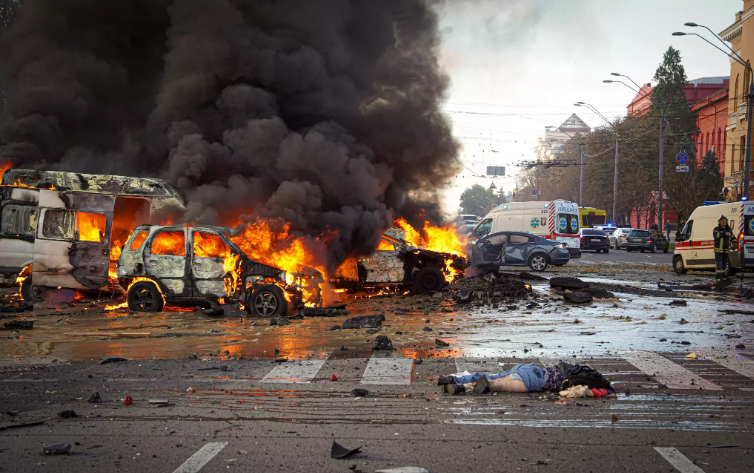The ongoing conflict between Russia and Ukraine has escalated to unprecedented levels, with devastating consequences for the Ukrainian capital, Kyiv. In a significant turn of events, Russia has launched a series of aerial strikes targeting Kyiv’s energy infrastructure, employing drones and missiles to inflict widespread damage. This article delves into the details of these attacks, their impact on Kyiv’s energy sector, and the broader implications for the region and beyond.
-
Russia Historical Context: Understanding the Russo-Ukrainian Conflict
To comprehend the gravity of the recent aerial strikes on Kyiv, it is essential to delve into the historical context of the Russo-Ukrainian conflict. The roots of this conflict trace back to Ukraine’s bid for independence from Soviet rule and Russia’s subsequent annexation of Crimea in 2014. Since then, tensions between the two nations have simmered, leading to sporadic outbreaks of violence and diplomatic standoffs.
-
Escalation of Hostilities: Aerial Assault on Kyiv
The recent escalation in hostilities has seen Russia intensify its military campaign against Ukraine, with Kyiv bearing the brunt of the onslaught. Reports indicate that Russian forces have targeted critical energy infrastructure in and around the Ukrainian capital, including power plants, substations, and fuel depots. These attacks, carried out using drones and missiles, have caused extensive damage and disrupted essential services.
-
Impact on Energy Infrastructure: Assessing the Damage
The aerial strikes on Kyiv’s energy infrastructure have had far-reaching consequences, exacerbating an already precarious situation. The destruction of power plants and substations has led to widespread blackouts, plunging entire neighborhoods into darkness and crippling essential services such as hospitals, water treatment plants, and communication networks. Moreover, the targeting of fuel depots has disrupted the supply chain, leading to fuel shortages and logistical challenges.
-
Russia Humanitarian Crisis: Implications for Civilians
The targeting of energy infrastructure in Kyiv has exacerbated the humanitarian crisis unfolding in Ukraine, with civilians bearing the brunt of the conflict’s fallout. The disruption of essential services has left vulnerable populations, including children, the elderly, and the sick, without access to vital resources such as electricity, heating, and clean water. Moreover, the destruction of infrastructure has hampered humanitarian aid efforts, making it difficult to provide assistance to those in need.
- International Response: Condemnation and Calls for Action
The aerial strikes on Kyiv’s energy infrastructure have elicited widespread condemnation from the international community, with world leaders condemning Russia’s actions and calling for an immediate cessation of hostilities. The United Nations, the European Union, and individual nations have issued statements condemning the attacks and expressing solidarity with Ukraine. Moreover, there have been calls for targeted sanctions against Russia and increased support for Ukraine’s defense efforts.
- Future Implications: Geopolitical Ramifications and Regional Stability
The escalation of hostilities in Ukraine and the targeting of Kyiv’s energy infrastructure have significant geopolitical ramifications and pose a threat to regional stability. The conflict has heightened tensions between Russia and NATO, raising concerns about the possibility of a broader military confrontation. Moreover, the disruption of energy supplies has reverberated across Europe, underscoring the continent’s vulnerability to external shocks and the need for diversification of energy sources.
- Conclusion: Charting a Path Forward
In conclusion, Russia’s aerial assault on Kyiv’s energy infrastructure represents a dangerous escalation of the Russo-Ukrainian conflict, with profound implications for Ukraine, the region, and the world at large. The targeting of critical infrastructure has exacerbated the humanitarian crisis, undermined stability, and raised the specter of a broader military confrontation. As the international community grapples with the fallout from these attacks, urgent action is needed to de-escalate tensions, protect civilians, and chart a path towards a peaceful resolution of the conflict. for more information click on this link
